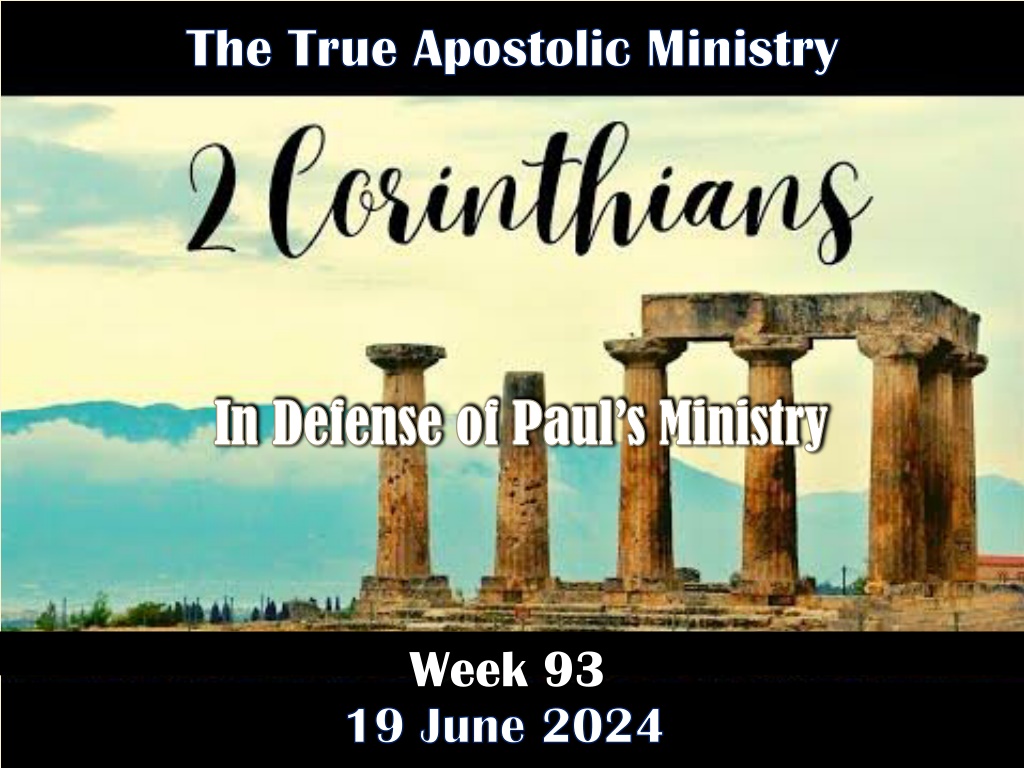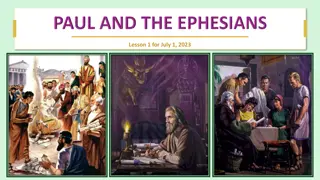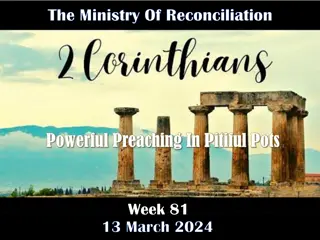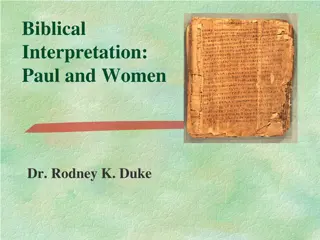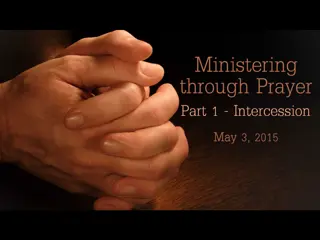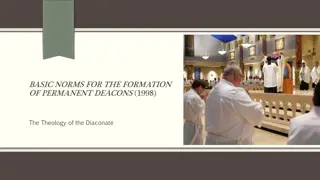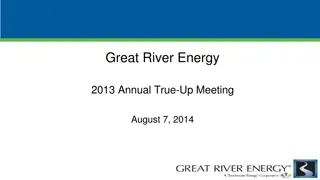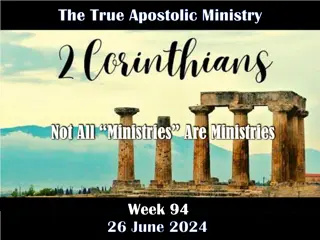True Apostolic Ministry in Paul's Defense
Explores the themes of authentic ministry and apostolic authority in Paul's letters to the Corinthians. Paul defends his apostolic authority against critics, emphasizing the divine origin and purpose of his ministry, urging believers to reaffirm allegiance to the true gospel ministry.
Download Presentation

Please find below an Image/Link to download the presentation.
The content on the website is provided AS IS for your information and personal use only. It may not be sold, licensed, or shared on other websites without obtaining consent from the author.If you encounter any issues during the download, it is possible that the publisher has removed the file from their server.
You are allowed to download the files provided on this website for personal or commercial use, subject to the condition that they are used lawfully. All files are the property of their respective owners.
The content on the website is provided AS IS for your information and personal use only. It may not be sold, licensed, or shared on other websites without obtaining consent from the author.
E N D
Presentation Transcript
The True Apostolic Ministry The True Apostolic Ministry In Defense of Paul s Ministry In Defense of Paul s Ministry Week 93 19 June 2024
2 CORINTHIANS INTRODUCTION In our continuing study of Second Corinthians, the themes of this letter revolves around both the theological concepts and the practical aspects of Christian living. The primary issue at Corinth was the recognition of authentic ministry and submission to apostolic authority. Paul s corrective was to provide guidance and encouragement as the church navigates the challenges that continue to influence their unity, discipline, and spiritual growth. Paul has already addressed The Crucial Concerns of Ministry (1:1 3:18), described the purpose of The Ministry of Reconciliation (4:1 5:21). He had painted The Realistic Portrait of Ministry (6:1 7:16) and examined money s relationship to ministry in The Self-Sacrificial Ministry (8:1 9:15).
2 CORINTHIANS INTRODUCTION Tonight we begin a NewSection: The True Apostolic Ministry (10:1-13:14). In this section, Paul addresses the question of authentic apostolic authority in ministry. In 10:1 18, Paul defends the authenticity of his ministry as an apostle against those in the Corinthian church who had criticized, ridiculed, and undermined his God-given authority. In 11:1 15, Paul directly challenges the authority and teaching of his opponents, fearing that the false teachers, might lead his spiritual children astray. In 11:16 12:21, Paul fights fire with fire, he takes on the challenge of his adversaries, and highlights his superior qualification as an apostle of Christ in contrast to their empty boasting.
2 CORINTHIANS INTRODUCTION In 13:1 14, Paul gives a final call to those in the church at Corinth to reaffirm their allegiance to the authentic apostolic ministry of the gospel and to return to a path of purity and righteousness. In our study, Paul addresses criticisms of his apostolic authority as an apostle, his conduct, and the nature of his ministry; emphasizes the divine power behind his ministry, and contrast spiritual warfare with worldly methods. Paul then points to the fact that true commendation comes from God, not from self-promotion, or comparison with others. Paul urges the Corinthians to recognize the legitimacy, divine origin, and purpose of his apostolic work beyond superficial appearances.
2 CORINTHIANS - LESSON OVERVIEW Swindoll. . . opens this study by reminding us that not all critics seek to demoralize or destroy. Sometimes criticism comes from a sincere heart, like the wife who says, Not that tie honey, or the loving father who says, Son, I know that isn t the best work you can do. Many times, criticism may be meant for good but be delivered too harshly. Even constructive criticism, well- intentioned and well-delivered, can hurt our feelings. Sometimes that s inevitable. But there s a difference between hurting another s feelings and harming another s character and reputation. The kind of criticism that s actually meant to harm a person comes from carping, causticdetractors whose words fly like arrows from bows of opinion or just plain ignorance.
2 CORINTHIANS - LESSON OVERVIEW Their goal? To take their target down, not to build them up or help them. Like biting or stinging insects, critics swarm in many species. Most of us have been stung by spiteful criticism s harsh barbs. Such experiences especially for people involved in ministry are unavoidable. Since we can t escape it, we might as well learn to except it, even better prepare for it. If we don t prepare ourselves for the vicious onslaught of mean-spirited criticism, we may vary well feel like giving up or resorting to sucker punches in retaliation. For the most part there are no classes on handling criticism. It s something we learn watching others deal with it or by enduring it yourself.
2 CORINTHIANS - LESSON OVERVIEW As we start this new section, Paul starts by diving headfirst into this subject of ministry-related criticism. We will learn how Paul dealt with some slanderous criticisms that had been hurled at him and the ministry he represented by his adversaries.
2 CORINTHIANS 10:1 6 1Now I, Paul, myself am pleading with you by the meekness and gentleness of Christ who in presence am lowly among you, but being absent am bold toward you. 2But I beg you that when I am present I may not be bold with that confidence by which I intend to be bold against some, who think of us as if we walked according to the flesh. 3For though we walk in the flesh, we do not war according to the flesh. 4For the weapons of our warfare are not carnal but mighty in God for pulling down strongholds, 5casting down arguments and every high thing that exalts itself against the knowledge of God, bringing every thought into captivity to the obedience of Christ,6and being ready to punish all disobedience when your obedience is fulfilled.
2 CORINTHIANS 10:1-6 While Paul s letter does not give the specific complaints or criticisms made by his opponents, nor how he learned of their criticisms; the letter simply sets forth his defense. Verse 1, addresses accusation of two-faced hypocrisy. Paul s opponents criticized him for being bold with his letters, but lacking courage in person. So, with a tone of sarcasm, Paul quotes his critics in Corinth. You are meek when you are with us, but you write bold letters when you re away from us. You re two-faced! When you actually have to face people, you re MR. NICE GUY, but when it s pen and paper, you boldly unleash! Would the real Paul please stand up?
2 CORINTHIANS 10:1-6 Verse 2, combats the criticism of fleshly motives. Paul s opponents accused him of walking in the flesh, of harboring impure motives, and of using manipulative methods. The Judaizers especially would have regarded Paul as an anything goes liberal because he didn t follow the Law to a tee. To a legalist, non-legalists always appear to be worldly. They also accused Paul of false motives grasping for power, prestige, and maybe even money. Finally, they would have perceived Paul s multiple letters and messengers as a means of manipulating them for his own selfish ends.
2 CORINTHIANS 10:1-6 Despite the inaccurate defamatory remarks by his critics, Paul approached the Corinthians with the meekness and gentleness of Christ (10:1). This tone reflects a calm, controlled response to the Corinthians who had come under the spell of the malicious accusers. Meekness does not mean weakness. It s not rolling over and playing dead as people kick and prod you. It s the same word meek Jesus used in Matthew 11:29 to describe Himself. But, Jesus did not hesitate to unleash a tirade of rebuke against Jewish hypocrisy (Matt. 23:13-33). Depending on the circumstances and context, a meek person can be gentle and humble or angry and severe.
2 CORINTHIANS 10:1-6 In 13:10, Paul gives the reason for the difference in his tone, yet to the critics, unwilling to grant Paul the benefit of the doubt, the smallest hint of inconsistency was blown out of proportion. To clear the fog in the Corinthians minds Paul in 10:3-5, seeks to persuade them that the battle against the criticism of the false teacher is a spiritual battle. It therefore requires spiritual warfare methods rather than a carnal approach to handling controversy (10:3). Paul knew he couldn t just show up in Corinth and start knocking heads, or simply pull rank, or just give them a tongue-lashing. Instead, he knew that the battle was in the hearts and minds of the Corinthian congregation.
2 CORINTHIANS 10:1-6 Paul had to draw them away from the deception of the false teachers and critics and ally them once again with their founding apostolic teacher. So, Paul had to destroy speculations and challenges to the knowledge of God by taking every thought captive to the obedience of Christ (10:5). In those days, cities constructed defenses to protect them from enemy invasion. These defense mechanisms included fortresses, lookout towers, and sturdy walls to prevent invader from gaining easy access. This is the image Paul has in mind as he compares the spiritual battle with an earthly city under siege. The fortress is our mind. Speculations represent the walls built around the fortress.
2 CORINTHIANS 10:1-6 Thus, the presuppositions, biases, and preconceived notions can shield the mind from the invasion of the truth, while the mind itself stands immovable in the face of the attack. Not until the Lord penetrated that thick wall of defense could Paul hope to attain a victory over the hearts and minds of the Corinthian Christians. They were kept captive under the influence of a few false teachers doing everything they could to keep Paul and his apostolic associates outside the wall they had constructed. In this battle against the false teachers, Paul needed to gain full allegiance of the true believers in Corinth. Many were already on his side.
2 CORINTHIANS 10:1-6 Nevertheless, far too many still wavered in their loyalty between the orthodox Christians and the false brethren. That group needed to be won back to a fully obedient commitment to Christ (10:6). When that happened, Paul could confront the pockets of ingrown disobedience and rebellion with a united front. Liberating the Corinthian church from its deceptive oppressors. Unfazed by the trumped-up criticisms of his opponents, Paul responded with four reasonable answers to their unreasonable attacks: 1) He corrected their perspective (10:7), 2) he clarified his motive (10:8-9), 3) he confessed his authenticity (10:10-12), and 4) he communicated the facts (10:13-18).
2 CORINTHIANS 10:7-18 Now, unfazed by the trumped-up criticisms of his opponents, Paul responded with four reasonable answers to their unreasonable attacks: 1) He corrected their perspective (10:7), 2) He clarified his motive (10:8-9), 3) He confessed his authenticity (10:10-12) and, 4) He communicated the facts (10:13-18).
2 CORINTHIANS 10:7 7Do you look at things according to the outward appearance? If anyone is convinced in himself that he is Christ s, let him again consider this in himself, that just as he is Christ s, even so we are Christ s.
2 CORINTHIANS 10:7 FIRST Paul corrected their perspective (10:7). Very simply he charged his critics with focusing on the external rather than the internal. The critics revealed their shallowness with their criticism, but its pain still cut deep. Of all their complaints, Paul s less than impressive physical appearance had a ring of truth. Based on a traditional description of Paul from the second century . . . Paul was a small man, bald-headed, bandy-legged, well-built, with eyebrows meeting, rather long- nosed, full of grace. Clearly, the crowd wasn t attracted to Paul s physical appearance. Yet, his critics complained about his less-than- impressive appearance.
2 CORINTHIANS 10:7 If these carping Judaizing snobs had paid closer attention to their own Old Testament Scriptures, they would have recalled that God sees not as man sees, for man looks at the outward appearance, but the Lord looks at the heart (1Sam. 16:7). People sometime criticize because they don t look deep enough. They have not peered below the surface or stood in the other persons shoes like the Corinthian critics. Had they looked beyond the surface of Paul s life, they would have seen Christ in him, just as they should see Christ within themselves (10:7).
2 CORINTHIANS 10:8-9 8For even if I should boast somewhat more about our authority, which the Lord gave us for edification and not for your destruction, I shall not be ashamed 9lest I seem to terrify you by letters.
2 CORINTHIANS 10:8-9 SECOND Paul clarified his motives in ministry (10:8-9). Having turned their attention from the externals to the internals, Paul made sure his opponents understood what was in his heart. down (10:8). While he had authority as an apostle to rebuke and correct the Corinthians for their sins, he wanted to edify not terrify (10:9). Paul s goal in ministry was to always build up, never tear in ministry. In contrast, his critics constantly tore Paul down in order to extend their own influence over the Corinthians (10:9). Here, Paul is completely transparent about his motives
2 CORINTHIANS 10:10-12 10 For his letters, they say, are weighty and powerful, but his bodily presence is weak, and his speech contemptible. 11Let such a person consider this, that what we are in word by letters when we are absent, such we will also be in deed when we are present. 12For we dare not class ourselves or compare ourselves with those who commend themselves. But they, measuring themselves by themselves, and comparing themselves among themselves, are not wise.
2 CORINTHIANS 10:10-12 THIRD Paul confessed his authority (10:10-12). Paul s ministry could be summed up with an old acronym WYSIWYG for what you see is what you get. Paul was Paul whether in their midst or through his letters (10:11). His tone might change depending on the situation, that s to be expected. But Paul himself didn t change, his view of Christ, his attitude toward holiness and sin, or his methods of preaching the gospel and calling believers to a committed Christian life. His critics accusations that Paul was a heavyweight in his letters but a lightweight in person was unfounded. Paul was just being himself. WYSIWYG Paul did not compare, nor compete.
2 CORINTHIANS 10:10-12 He had no dirty secrets in his past that he need to hide. Paul referenced a specific group of people who felt the need to commend themselves (10:12) that is, to compare themselves by their own standards, trying to demonstrate their superiority over other ministries. Swindoll says . . . I have never seen such vicious and ambitious competition in ministry as I see today in North American Christianity. So many pastor are competing for the limelight, trying to grow bigger, look better, come across as edgier, cooler, more relevant. Ultimately, they won t be able to keep up with the charade.
2 CORINTHIANS 10:10-12 It takes an incredible amount of energy to pretend to be something that you are not. People need to be who they are. They need to get out of the way and turn the spotlight back onto Jesus. Any and all in ministry should point their fans in Jesus direction, and model authenticity, even if it means people will no longer embrace you as some sort of semi-divine superstar.
2 CORINTHIANS 10:13-18 13We, however, will not boast beyond measure, but within the limits of the sphere which God appointed us a sphere which especially includes you. 14For we are not overextending ourselves (as though our authority did not extend to you), for it was to you that we came with the gospel of Christ; 15not boasting of things beyond measure, that is, in other men s labors, but having hope, that as your faith is increased, we shall be greatly enlarged by you in our sphere,16to preach the gospel in the regions beyond you, and not to boast in another man s sphere of accomplishment. 17But he who glories, let him glory in he Lord. 18For not he who commends himself is approved, but whom the Lord commends.
2 CORINTHIANS 10:13-18 THIRD Paul communicated the facts about ministry (10:10-12). In ministry, there is nothing like facts to help in times of unjust criticism. Here, Paul rapidly rehearsed the facts about his own ministry scope as it involved the Corinthians. (1) God had given the ministry to reach the Gentiles with the gospel (10:13). The Judaizers severely criticized his ministry focus, accusing Paul of trying to spread his own personal kingdom authority rather than the kingdom of God.
2 CORINTHIANS 10:13-18 (2) Within the sphere of his evangelistic calling, Paul reached the Corinthians (10:14). Like parasites, the Judaizers who came after Paul invaded the church and began to boast of their work as if they had established the church in Corinth themselves. (3) Paul hoped the Corinthians growth would lead to additional resource to expand his ministry (10:15-16). The Judaizers strategy to boast their conquests involved overhauling churches that had already been planted. While, Paul took the approach of preaching where no churches had yet been planted. Therefore, Paul had reason to boast based on the facts, his opponents had no reason to boast.
2 CORINTHIANS 10:13-18 Yet, Paul remained meek, humble, and patient in the midst of their criticisms, while they boasted boldly in their hijacking of the churches. Paul quotes Jeremiah 9:24, He who boasts is to boast in the Lord . . . not in their own accomplishments, riches, or strength (10:17). Ultimately, God alone is the judge whose commendation counts. Self-promotion and self-approval are meaningless, the hollow words of braggarts. True servants of God present the facts as they are and then let the Lord God sort it out.
APPLICATIONS OF THE LESSON Facing Criticism in the Throes of Ministry
APPLICATION CRITICISM IN MINISTRY Swindoll closes by saying . . . One of my favorite questions to ask someone at an ordination council, in an interview for a ministry position or at the threshold of a promotion to a position of leadership in company or business is: How do you handle criticism? It s a vital question seldom consider, much less actually asked and answered. As we reflect on Paul s own response to the mental, emotional, and spiritual attacks that came to him in the form of unjust criticism from unrighteous people, we need to come to terms with the reality of criticism in ministry. Everybody involved in ministry full time, part time, or volunteer needs to understand the challenges of criticism and be prepared to handle them in a wise, godly manner.
APPLICATION CRITICISM IN MINISTRY The following three facts about criticism will help arm us for the spiritual battle that s coming. First no one is immune to criticism. Unfortunately, it s an unavoidable part of living among human beings. Do your best not to get paranoid. Expect criticism, but don t obsess over it. Don t run in fear of it. Face it with strong resolve. Since we can t escape it, we might as well ready ourselves for it. Decide beforehand that you will neither lie down and give up nor stand up and engage in an ugly fight over every nit- picking critique. Second criticism can be taken too lightly or too seriously. If we take criticism too lightly and let every less-than-positive comment bead off of us like rain on a windshield, we might ignore valuable instruction that could help us.
APPLICATION CRITICISM IN MINISTRY Where would we be without our parents correction? Or without that close friend who lives out Proverbs 27:6 and points out our blind spots? Taking criticism lightly can deprive us of opportunities for personal development and growth. We will remain juvenile and immature, unteachable and stubborn. On the other hand, if we take criticism too seriously, we could lose heart. If we obsess over every biting comment, harsh email, disapproving frown, and anonymous letter, we might shrink back, lacking confidence in everything we do. Second-guessing every decision. Regretting every minor mistake. Crafting our message or lessons to please individual people. These overreactions will literally demoralize a pastor and paralyze a ministry.
APPLICATION CRITICISM IN MINISTRY We might eventually decide never to dream again. Worse, we might quit before finishing the task. A balanced approach is to listen to legitimate criticism, but take unjust criticism with a grain of salt. Here are a few tips: Ignore the really scathing criticisms as well as the exalted praise. Neither is helpful. You will meet people in ministry who can say nothing good. Others can say nothing bad. Almost without exception, the truth is somewhere in the middle. Don t read anonymous criticisms. If individuals won t reveal their names to you, then those person don t really care about you; their motives are usually destructive, not constructive.
APPLICATION CRITICISM IN MINISTRY On the other hand, anonymous compliments can be trusted because the person who shares without recognition is clearly not interested in flattery or softening you up for a favor, which adds to the likelihood that they offer a sincere message of gratitude. We all need somebody in our lives to help guide us through these verbal minefields. Keep a few personal family members and friends close at hand to discuss both criticisms and praises to help keep you balanced. doesn t. If a criticism is based on a misunderstanding, clear it up as soon as possible. Those are usually easy to dispense with, and once the air is cleared, you will gain not only a sympathizer but a supporter. Third some criticism needs to be answered; much of it
APPLICATION CRITICISM IN MINISTRY If at all possible, meet in person; if not, keep the dialogue open to make sure you can avoid further miscommunication. If it s a matter of a minor disagreement, consider a meeting of the minds. If good might come from an exchange of thoughts, put your heads together and think through the major issues. Even if there is no change of mind on either side, it s a noble goal to come to a mutual understanding of each others perspective. Sometimes you simply agree to disagree. If responding to the criticism would only lead to more arguments, it might be best to let the criticism remain unanswered. You can usually tell by the level of venom involved If it sounds mean-spirited, it probably is.
APPLICATION CRITICISM IN MINISTRY If the critic is known as a chronic grouch, experience has already taught you that engaging in that kind of combat will result only in a stalemate. There is no need to become a pen pal with someone looking for a fight. Let it go. We will all face criticism in ministry, and in life. We need to prepare ourselves so we don t pass it off too lightly or worry over it too seriously. And we need to discern whether the criticism needs to be answered. When we go into ministry situations with our eyes wide open, we will be able to see criticism coming and deal with it wisely.
NEXT CLASS 26 June 2024 Before next class, read the below chapters in the KJV and in one other versions of the Bible, i.e., NIV, NRSV, TLB, CEV, etc Chapter 11:1 15 Not All Ministries Are Ministries
